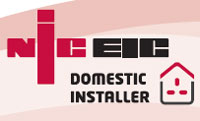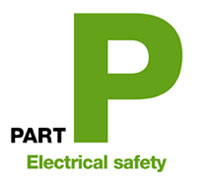 This article is the second part of the "How Safe is the Wiring in Your Home?" advice from NICEIC - found online as a PDF file here. After dealing with: How safe is the wiring in your home?, Does your property need a complete rewire?, and The job of wiring consists of..., this article will continue to speak about:
This article is the second part of the "How Safe is the Wiring in Your Home?" advice from NICEIC - found online as a PDF file here. After dealing with: How safe is the wiring in your home?, Does your property need a complete rewire?, and The job of wiring consists of..., this article will continue to speak about:
- Make sure you rewire first and then decorate!
- About Part P of the Building Regulations;
- About the Portable Equipment Outdoors;
- Which electrician should I choose for the re-wiring?
Rewire your home first and decorate later!
Rewiring your home can be a messy job – it’s best to forget about decorating until it is finished. It can also cause major disruptions to the household as carpets and floorboards are up. You could also be without cooking facilities and hot water for some time so you should try to keep young children and pets out of the way. Or if you have confidence in your chosen electrician, you could take a holiday whilst the work is carried out (this may also result in a lower price as the contractor does not have to put the boards back, carpets down and get the circuits back on each night).To minimise disruption set some ground rules with your electrician before work begins:
- Get agreement that they will clear up after each day’s work;
- Get agreement that they will screw down all floorboards raised after completion;
- Get agreement that upon completion they will re-lay all carpets.
Within 30 days of the work being completed, you will also receive a certificate that confirms that the work complies with Part P of the Building Regulations. If you used a NICEIC electrician, the certificate will carry the NICEIC logo and the name of the firm you used. It is a legal requirement to comply with Building Regulations, so you should ensure that your electrician is registered with a government-authorised Part P scheme. If, during the course of the work, you require alterations or additions to the installation, request a fixed price. Finally, check with your electrician if the local Public Supply Authority will be required to disconnect and re-connect the electrical supply to which there may be additional charges.
About the Part P of the Building Regulations
 Part P of the Building Regulations for England and Wales was introduced by the government in January 2005, with an aim of reducing the number of accidents in the home related to faulty electrical installations. Similar laws apply in Scotland. It is now a legal requirement for electricians, kitchen, bathroom and gas installers, and all other trades or individuals involved in carrying out domestic electrician work to comply with Building Regulations.
Part P of the Building Regulations for England and Wales was introduced by the government in January 2005, with an aim of reducing the number of accidents in the home related to faulty electrical installations. Similar laws apply in Scotland. It is now a legal requirement for electricians, kitchen, bathroom and gas installers, and all other trades or individuals involved in carrying out domestic electrician work to comply with Building Regulations.Most electrical installations carried out in a property are now notifiable - the local authority building control must be notified prior to the work being carried out. The exception is if it is carried out, and certified by a person registered with a government-authorised competent scheme such as NICEIC. Failure to comply with Part P is a criminal offense and local authorities have the power to require the removal or alteration of work that does not comply with regulations.



